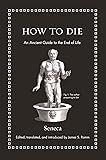How to Die: An Ancient Guide to the End of Life (Ancient Wisdom for Modern Readers)
amazon.com
How to Die: An Ancient Guide to the End of Life (Ancient Wisdom for Modern Readers)

“Does death make trial of me so frequently? Let it: I’ve done likewise to death, for a long time.” When was that, you ask? Before I was born: for death is nonexistence. I know what that’s like. It will be the same after me as it was before me.
to all true happiness. If freedom were destroyed by a tyrant or health were forever compromised, such that the promptings of Reason could no longer be obeyed, then death might be preferable to life, and suicide, or self-euthanasia, might be justified.
In the time in between, we have sense and experience; before and after is true peace.
Yet here too is a virtue: I’m being thrown out, but let me take my leave nonetheless. The wise man is never thrown out, for to be thrown out is to be expelled from a place that you leave unwillingly; the wise man does nothing unwillingly; he flees from necessity, since he desires that which it will force upon him. Farewell. (Epistle
Let me at last come to an end, but I will add this one thought: neither infants, nor children, nor those whose minds are afflicted, are afraid of death; it would be repellent, if our reason did not offer us the same contentment to which they are led by their folly. Farewell. (Epistle 36.7–12)
But what if a great yearning for longer life holds you in its grip? You must believe that none of the things that depart from your sight, and that are subsumed into the universe from which they sprang (and will soon spring again), is used up; these things pause, but do not die, just as death, which we fear and shun, interrupts but does not strip
... See moreNothing can be of such great benefit to you, in your quest for moderation in all things, than to frequently contemplate the brevity of one’s life span, and its uncertainty. Whatever you undertake, cast your eyes on death. (Epistle 114.27)
We go wrong in this, Lucilius, if I’m not mistaken: we think that death comes after, whereas in fact it comes both before and after. Whatever existed before us was death. What does it matter whether you cease to be, or never begin? The outcome of either is just this, that you don’t exist.
The Stoics taught their followers to seek an inner kingdom, the kingdom of the mind, where adherence to virtue and contemplation of nature could bring happiness even to an abused slave, an impoverished exile, or a prisoner on the rack. Wealth and position were regarded by the Stoics as adiaphora, “indifferents,” conducing neither to happiness nor
... See more